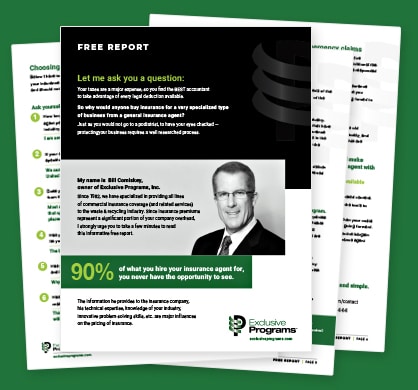In the waste and recycling industry, particularly for garbage collection companies in Florida, understanding workers compensation regulations is essential. Navigating the complexities of workers comp exemption Florida can save businesses significant amounts of money and ensure they remain compliant with state laws. This comprehensive guide will delve into the crucial facts about workers comp exemption in Florida, providing insights tailored to business owners who manage 5 to 10 vehicles, maintain a good loss ratio, and operate in the waste and recycling sector.
Understanding Workers Comp Exemption Florida
Workers’ compensation insurance provides medical benefits and wage replacement to employees who are injured on the job. However, in Florida, certain business owners can opt out of this requirement through a workers comp exemption. This can be a valuable option for those looking to reduce insurance costs while still managing risk effectively.
Who Qualifies for Workers Comp Exemption in Florida?
In Florida, the criteria for obtaining a workers comp exemption vary depending on the business structure. Sole proprietors, partners, and corporate officers of non-construction businesses can apply for an exemption. This means that if you own a garbage collection company with a small fleet, you might be eligible for a workers comp exemption, significantly reducing your insurance expenses.
How to Apply for a Workers Comp Exemption in Florida
The process for obtaining a workers comp exemption Florida involves several steps:
- Determine Eligibility: Confirm that your business structure qualifies for an exemption.
- Complete the Application: Submit the necessary forms to the Florida Division of Workers’ Compensation. This includes detailed information about your business and your role within it.
- Pay the Fee: There is a non-refundable application fee that must be paid upon submission.
- Await Approval: Once your application is reviewed and approved, you will receive a certificate of exemption.
It’s important to note that the exemption is not permanent and must be renewed periodically to remain valid.
The Benefits of Workers Comp Exemption Florida
Choosing a workers comp exemption Florida offers several advantages for businesses in the waste and recycling industry:
- Cost Savings: By opting out of workers compensation insurance, eligible business owners can save on premium costs, which can be a significant expense, especially for businesses with multiple vehicles and employees.
- Administrative Ease: With one less insurance policy to manage, business owners can streamline their administrative processes, allowing more focus on operational efficiency and growth.
- Flexibility: Businesses can allocate resources saved from workers comp premiums to other areas, such as improving safety measures, upgrading equipment, or expanding services.
Workers Comp Florida Exemption: A Strategic Choice for Waste and Recycling Companies
For waste and recycling companies, particularly those involved in garbage collection, the decision to opt for a workers comp exemption must be strategic. Given the high-risk nature of the industry, it’s crucial to balance cost savings with adequate risk management. Here are some key points to consider:
- Risk Assessment: Thoroughly assess the risks associated with your operations. While an exemption can save money, it’s essential to ensure that you have other safety nets in place.
- Safety Programs: Invest in robust safety programs to minimize the likelihood of workplace injuries. Training employees on safe practices and maintaining equipment can reduce incidents and associated costs.
- Alternative Coverage: Consider alternative insurance coverages that can protect your business in the event of an accident, even without workers comp insurance.
Challenges and Considerations
While a workers comp exemption in Florida offers numerous benefits, it’s not without its challenges. Business owners must carefully weigh these factors before opting for an exemption:
Legal Compliance
Remaining compliant with state laws is paramount. Failure to maintain the proper documentation or renew the exemption on time can result in penalties or loss of the exemption status. It’s crucial to stay informed about any changes in legislation that might affect your exemption status.
Employee Morale and Trust
Employees may have concerns about not being covered by workers compensation insurance. Transparent communication about the reasons for the exemption and the measures in place to protect them is essential. Building trust and ensuring employees feel safe and supported at work can mitigate potential morale issues.
Financial Risk
Opting out of workers compensation insurance transfers the financial risk of workplace injuries to the business. This means that in the event of an injury, the business owner could be responsible for covering medical expenses and lost wages out-of-pocket. It’s important to have a financial plan in place to address such scenarios.
Best Practices for Managing Workers Comp Florida Exemption
To maximize the benefits of a workers comp exemption, consider implementing these best practices:
- Regular Training: Conduct regular safety training sessions for employees to keep them informed about best practices and new safety protocols.
- Safety Audits: Perform regular safety audits of your operations to identify and mitigate potential hazards.
- Emergency Plans: Develop and maintain comprehensive emergency response plans to handle workplace accidents swiftly and effectively.
- Insurance Reviews: Periodically review your insurance policies and consider additional coverage options that might supplement your exemption.
Navigating the intricacies of workers comp exemption Florida can be a game-changer for waste and recycling companies, particularly those in garbage collection. By understanding the eligibility criteria, benefits, and challenges, business owners can make informed decisions that align with their financial goals and operational needs.
Implementing strategic safety measures and maintaining compliance with state regulations will ensure that opting for a workers comp exemption becomes a viable and beneficial option for your business.
For more information on how Exclusive Programs, Inc. can assist with managing your insurance needs and exploring workers comp exemptions, contact us today to speak with our experts. Our team is dedicated to helping you navigate the complexities of insurance while ensuring your business remains protected and profitable.






